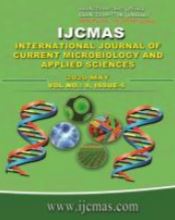


 National Academy of Agricultural Sciences (NAAS)
National Academy of Agricultural Sciences (NAAS)

|
PRINT ISSN : 2319-7692
Online ISSN : 2319-7706 Issues : 12 per year Publisher : Excellent Publishers Email : editorijcmas@gmail.com / submit@ijcmas.com Editor-in-chief: Dr.M.Prakash Index Copernicus ICV 2018: 95.39 NAAS RATING 2020: 5.38 |
Maize cultivation for vegetable purpose, such as baby corn is a diversified and value addition in food industries. Baby corn is the female inflorescence in the maize plant, harvested within two days of silk emergence and is sweet in taste and crisp which is a source of foreign earning exchange for India and successful in countries like Thailand and Taiwan has now proven to be a successful venture. The most crucial factors in scientific crop productions are nutrient management. In modern agriculture the knowledge of optimum dose of crop nutrition is of prime concern. The views of active investigators, theoreticians and practitioners on growth, yield, quality, nutrient uptake, soil health and economics of baby corn can be easily understood by this article. Maize and specialty corn requires very high quantities of nutrients during the period of efficient utilization and for gaining higher productivity because maize is the nutrient exhaustive crop. Through the application of chemical fertilizer can maximize the productivity of baby corn but in the long run it will impair the sustainability of growing field. Furthermore, substitution of some amount of chemical fertilizers with either organic source of nutrient along with biofertilizers can maintain economic stability of farmers and sustains soil health. Majorities of the researchers had suggested fertility level of 150-180 kg nitrogen, 60-90 kg P2O5, 60-90Kg K2O, 5-10 kg Zn and 30-40 kg Sulphur ha-1 for higher baby corn yield, fodder yield, nutrient content and monetary returns to the growers. However, substitution of 25% nitrogen by organic sources viz., FYM/vermicompost along with biofertilizers was more beneficial for baby corn yield, fodder yield, economics and improvement of soil fertility status.
 |
 |
 |
 |
 |